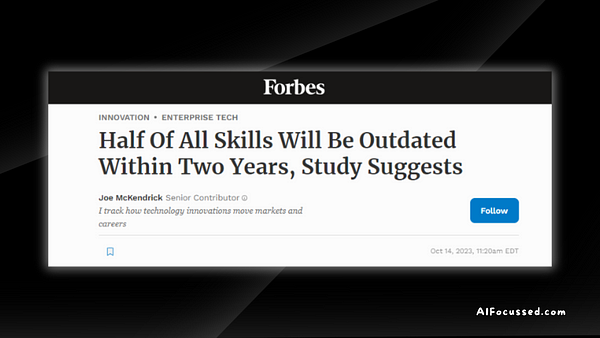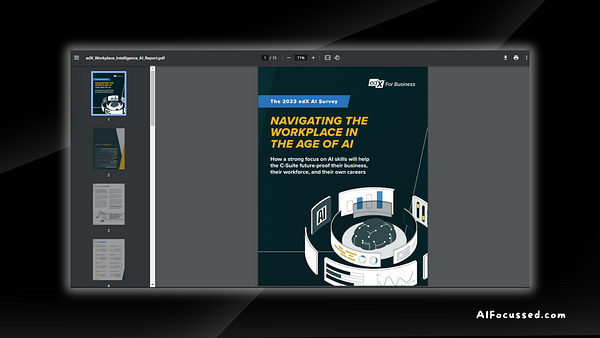Artificial intelligence is advancing at an incredibly rapid pace. With new innovations in generative AI like ChatGPT and image generators being released in quick succession, even top executives believe the workforce is on the brink of transformational change.
Startling Findings from a Recent Workforce Survey on AI

A 2022 survey of 1,600 respondents including 800 executives and 800 employees uncovered some startling statistics about AI’s impending impact:
- Almost half (49%) of the skills that exist in today’s workforce are predicted to become irrelevant by 2025 — an extremely short timespan of just 2 years from now.
- An equal percentage (47%) felt their workforces overall are unprepared for this AI-driven future of work.
- 56% estimated over half of entry-level knowledge worker roles will be eliminated in the next 5 years due to advancing AI.
- 79% foresee entry-level jobs essentially ceasing to exist, requiring an entirely new set of skills for those entering the job market.
“Identifying skills shortages is not a surprising result to come out of an educational platform provider, but the short timespan is an eye-opener,” the survey authors noted.
Even high-level executive roles aren’t immune — over half (56%) of executives predicted their own roles will be partially or fully replaced by AI. Shockingly, 47% believe most or all CEO duties could be automated — and 49% of CEOs agree!

You can read the Entire Survey by edX, an online education platform.
However, not all industry leaders align with these more pessimistic AI outlooks…
Some Experts Are Skeptical About Heavy Impacts on Near-Term Career Goals
Richard Jefts, EVP and GM at software company HCL, argues the immediate results of AI will be minimal for most established professionals:
“While many companies claim to be leveraging AI, the reality is that most are still in the early stages of adoption. Expect more of a longer-term impact on careers as AI matures.”
This view expects AI to reshape careers, but slowly and incrementally rather than all at once. There are still many uncertainties around how exactly AI might redirect jobs and responsibilities.
“Almost every professional whose day-to-day is connected with digital activity will need to re-adjust their career goals as they begin to see changes in their daily work processes,
“But it is very difficult to precisely predict where and when that redirection will occur.”
says Frederico Braga, Head of Digital at biopharmaceutical company Debiopharm.
AI as a Career Booster Rather Than Just a Replacement
Some don’t see AI as just taking away human jobs and tasks, but augmenting professionals to make them even better at what they do:
“Rather than re-directing your core skills, one valuable career skill is figuring out how to use emerging AI tools as a booster to make your strengths even stronger,”
“Ask how you can leverage AI to become incrementally better at what you already do best.”
advises Jonathan Martin, President at tech company WEKA.
Vittorio Cretella, CIO at P&G, echoes this view:
“Most successful applications of AI will amplify human skills, not simply substitute them. Where humans will continue to make a difference is in problem definition — decomposing problems, identifying patterns, before attempting to define an algorithmic solution.”
So while AI may replace some tasks, humans still play an integral role in creativity, strategy, and the softer skills involved in problem-solving.
Executives Recognize Upskilling in AI is Critical for Career Resilience
The survey found extensive agreement among executives that improving their AI skills is vital for the future:
- 92% said it’s important to upgrade their AI skills within 1–2 years
- The same percentage already actively use AI in their roles
- 79% worry that not gaining AI proficiency will leave them unprepared for the shifting landscape of work
Although most feel optimistic about AI’s impending impact, some are overwhelmed by the sheer pace of change. Familiarity with AI capabilities can help professionals capitalize on its potential value:
“Being familiar with AI and its capabilities will enable business professionals to leverage its potential, particularly in areas such as HR, sales, and support,”
says Richard Jefts of HCL Software.
IT leaders in particular will be deeply affected by emerging AI as they deliver, manage and maintain AI systems. But even at senior levels, reskilling is crucial:
“Finding leaders and individuals with strong soft skills is a greater challenge than generative AI cannot accomplish,”
Jefts continues.
As machine capabilities expand into new domains, the irreplaceably “human” skills will only increase in value.
Creativity and Problem-Solving Skills Will Retain Strong Demand
Critical thinking, creativity, complex communication, strategic planning, and the cognitive flexibility to adapt to unexpected changes are deeply human capabilities AI cannot replicate.
Jonathan Martin emphasizes that innovation and vision require distinctly human traits — AI cannot spark “lightbulb moments” or conceive ambitious ideas from scratch. While apps grow more advanced in generating content or options, humans still need to:
- Develop effective prompts
- Curate, analyze and contextualize the output
- Determine how it should ultimately be applied
And when obstacles arise, as they inevitably do:
“Human creativity, agility, and tenacity will be required to address them masterfully. This real-world ingenuity may prove difficult for AI to replace,”
Martin notes.
So while technical skills face displacement from automation, distinctly “soft” skills are likely to enjoy soaring demand.
Jefts concludes finding well-rounded leaders and team players with a mix of social abilities and occupational competencies will only grow more competitive.

Practical Next Steps: How Should Professionals Prepare?
Continuous learning is essential to stay ahead of marketplace changes. Workers should proactively engage in lifelong education around emerging technologies and trends within their industry.
Diversifying skills also adds flexibility and resilience. Consider how your expertise might translate across multiple roles or sectors, rather than overspecializing.
And as AI permeates business and society, acceptance and openness is key. Instead of resistance, explore how AI could augment productivity, creativity, and innovation. Working with the technology — not against it.
Entry-level workers and those in digitally-driven roles likely face the most disruption. But intentional reskilling, soft skill development, and keeping an open & flexible mindset will ease the transition for all career levels.
Frequently Asked Questions – FAQs
The survey predicts that almost half of today’s skills will be irrelevant by 2025.
Over half of executives anticipate partial or full replacement of their roles by AI.
Continuous learning, diversifying skills, and embracing AI’s potential for productivity and innovation are recommended.
AI cannot replicate critical thinking, creativity, complex communication, strategic planning, and cognitive flexibility.
92% of executives consider upgrading their AI skills within 1–2 years important for future readiness.
Soft skills, including effective communication and problem-solving, become crucial as machine capabilities advance.
The future remains ever-uncertain. But one thing is clear — the only constant is change itself. Continuous self-improvement provides the agility to evolve alongside AI, capitalizing on its benefits rather than being left behind.
Be sure to share your thought below in the comment section. I’ll be glad to hear your feedback on this topic.



